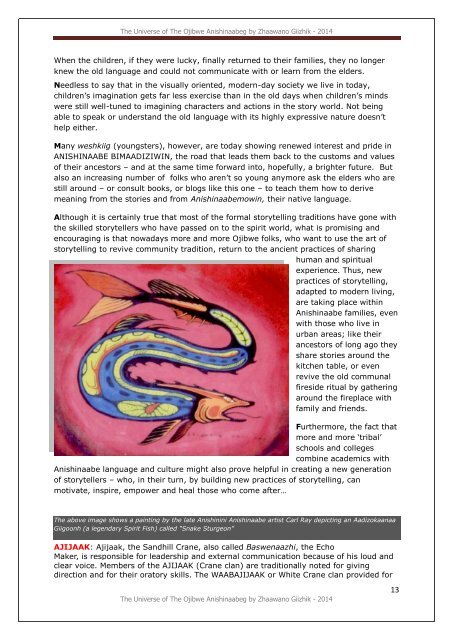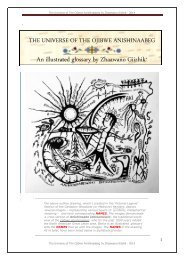The Traditional Anishinaabe World View.pdf
Illustrated glossary offering a cross section of the traditional worldview of the Ojibwe Anishinaabeg, who for the past 1000 years or more inhabit Gaa-zaaga'ekanikaag, the Land of Many Lakes ( the North American Great Lakes area).
Illustrated glossary offering a cross section of the traditional worldview of the Ojibwe Anishinaabeg, who for the past 1000 years or more inhabit Gaa-zaaga'ekanikaag, the Land of Many Lakes ( the North American Great Lakes area).
Create successful ePaper yourself
Turn your PDF publications into a flip-book with our unique Google optimized e-Paper software.
<strong>The</strong> Universe of <strong>The</strong> Ojibwe <strong>Anishinaabe</strong>g by Zhaawano Giizhik - 2014<br />
When the children, if they were lucky, finally returned to their families, they no longer<br />
knew the old language and could not communicate with or learn from the elders.<br />
Needless to say that in the visually oriented, modern-day society we live in today,<br />
children’s imagination gets far less exercise than in the old days when children’s minds<br />
were still well-tuned to imagining characters and actions in the story world. Not being<br />
able to speak or understand the old language with its highly expressive nature doesn’t<br />
help either.<br />
Many weshkiig (youngsters), however, are today showing renewed interest and pride in<br />
ANISHINAABE BIMAADIZIWIN, the road that leads them back to the customs and values<br />
of their ancestors – and at the same time forward into, hopefully, a brighter future. But<br />
also an increasing number of folks who aren’t so young anymore ask the elders who are<br />
still around – or consult books, or blogs like this one – to teach them how to derive<br />
meaning from the stories and from <strong>Anishinaabe</strong>mowin, their native language.<br />
Although it is certainly true that most of the formal storytelling traditions have gone with<br />
the skilled storytellers who have passed on to the spirit world, what is promising and<br />
encouraging is that nowadays more and more Ojibwe folks, who want to use the art of<br />
storytelling to revive community tradition, return to the ancient practices of sharing<br />
human and spiritual<br />
experience. Thus, new<br />
practices of storytelling,<br />
adapted to modern living,<br />
are taking place within<br />
<strong>Anishinaabe</strong> families, even<br />
with those who live in<br />
urban areas; like their<br />
ancestors of long ago they<br />
share stories around the<br />
kitchen table, or even<br />
revive the old communal<br />
fireside ritual by gathering<br />
around the fireplace with<br />
family and friends.<br />
Furthermore, the fact that<br />
more and more ‘tribal’<br />
schools and colleges<br />
combine academics with<br />
<strong>Anishinaabe</strong> language and culture might also prove helpful in creating a new generation<br />
of storytellers – who, in their turn, by building new practices of storytelling, can<br />
motivate, inspire, empower and heal those who come after…<br />
<strong>The</strong> above image shows a painting by the late Anishinini <strong>Anishinaabe</strong> artist Carl Ray depicting an Aadizokaanaa<br />
Giigoonh (a legendary Spirit Fish) called “Snake Sturgeon”<br />
AJIJAAK: Ajijaak, the Sandhill Crane, also called Baswenaazhi, the Echo<br />
Maker, is responsible for leadership and external communication because of his loud and<br />
clear voice. Members of the AJIJAAK (Crane clan) are traditionally noted for giving<br />
direction and for their oratory skills. <strong>The</strong> WAABAJIJAAK or White Crane clan provided for<br />
<strong>The</strong> Universe of <strong>The</strong> Ojibwe <strong>Anishinaabe</strong>g by Zhaawano Giizhik - 2014<br />
13





